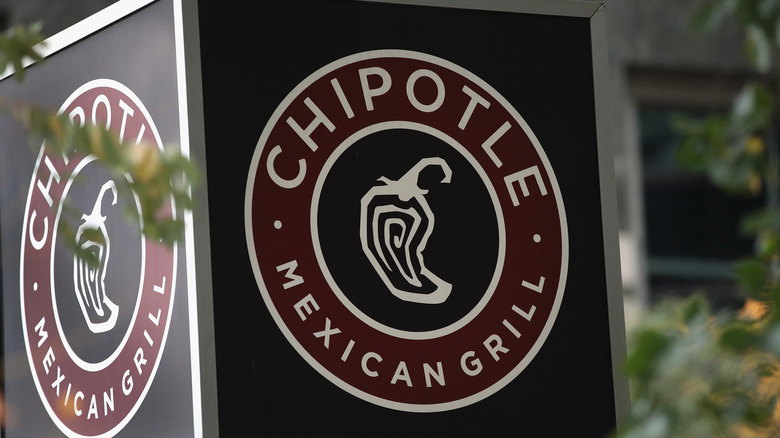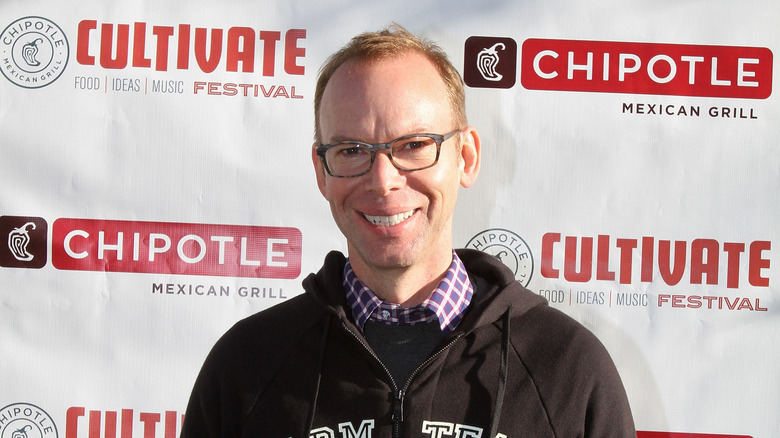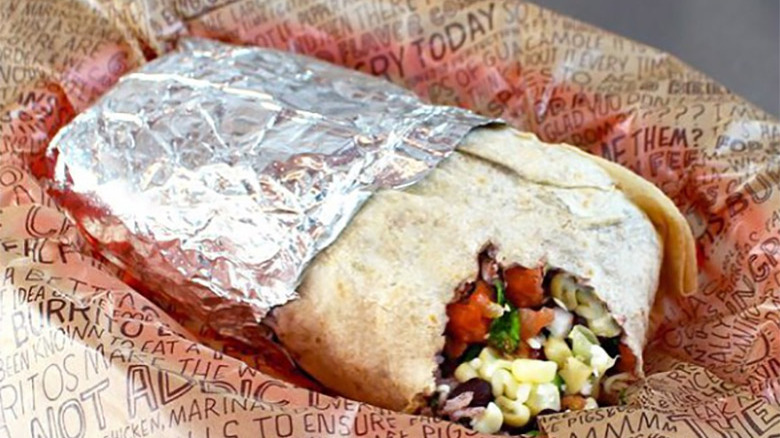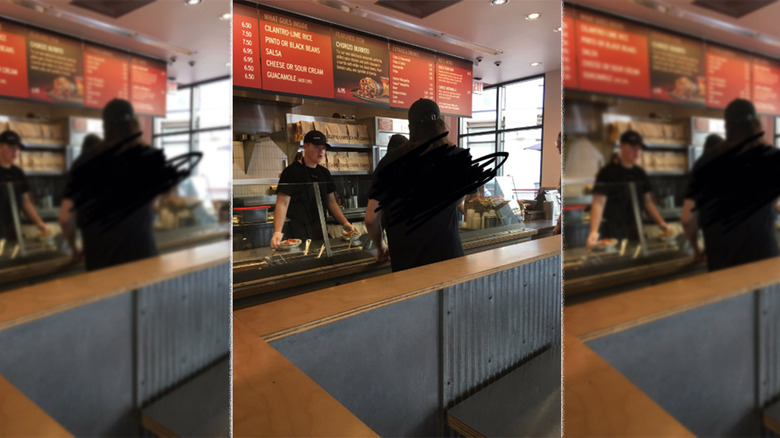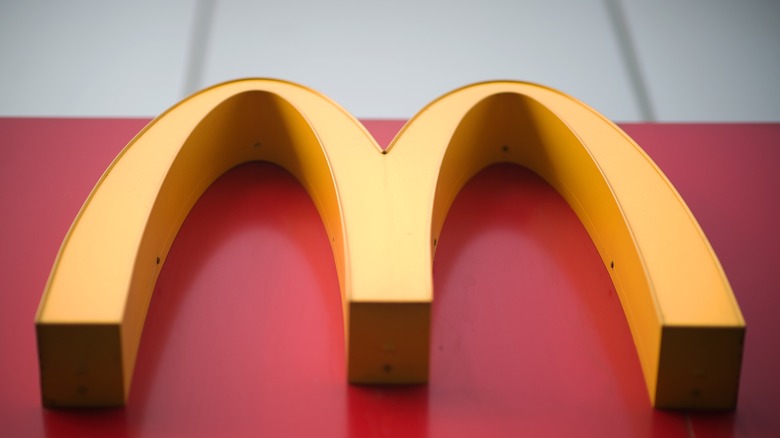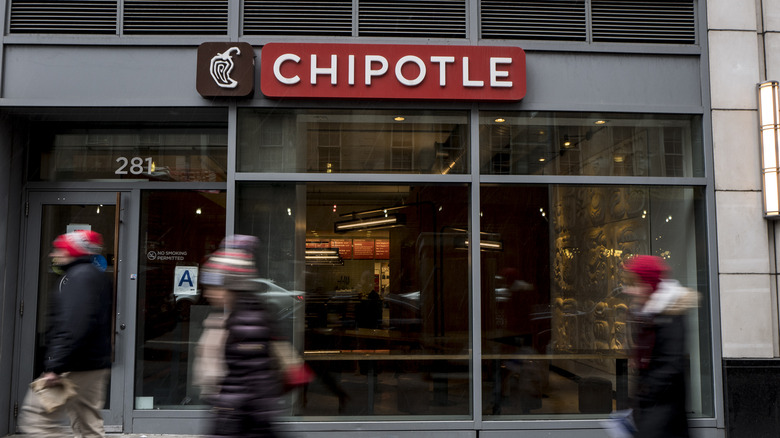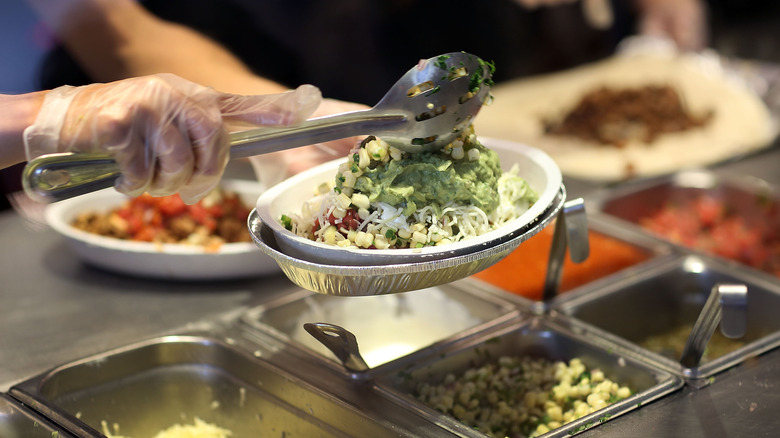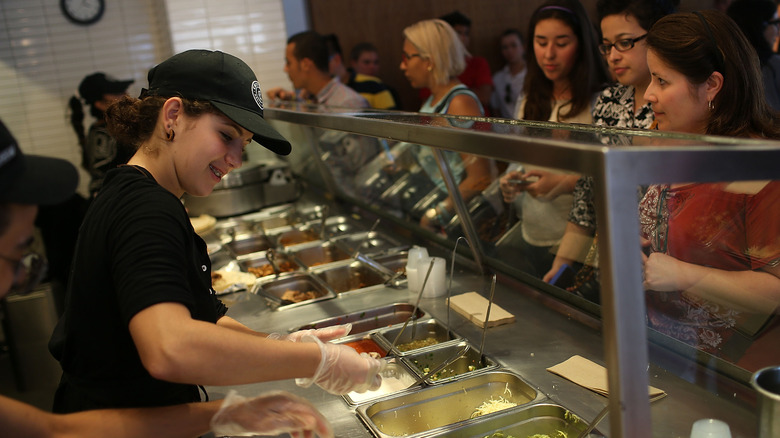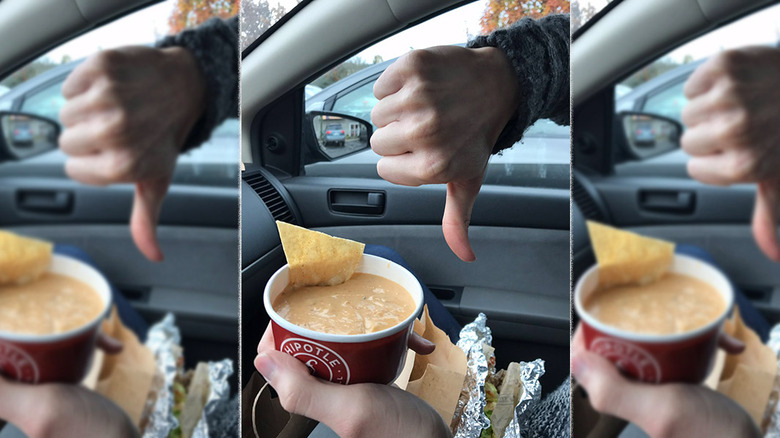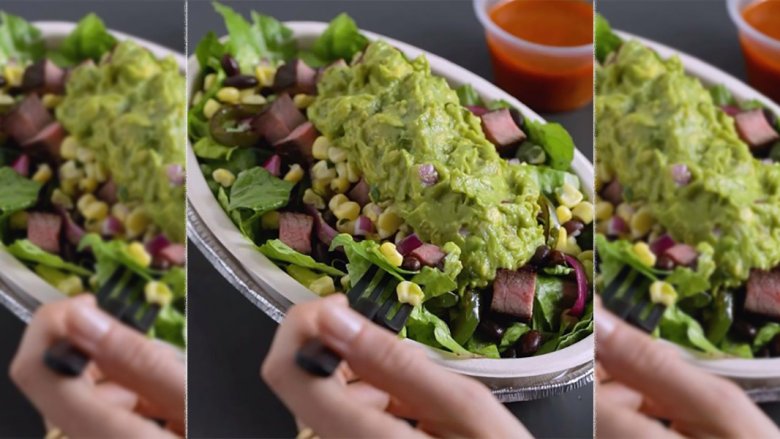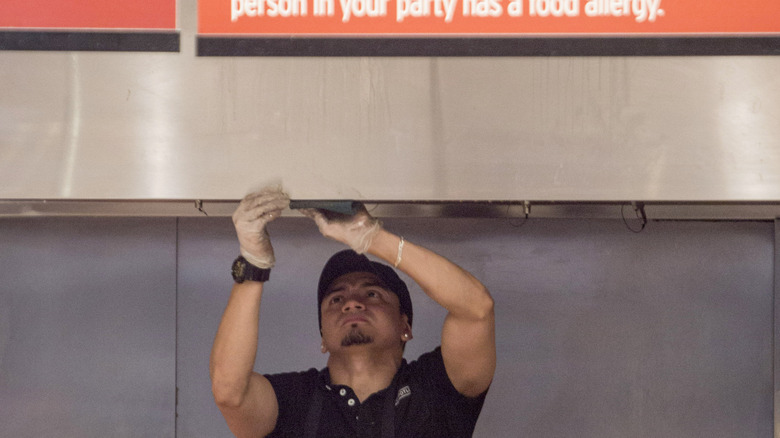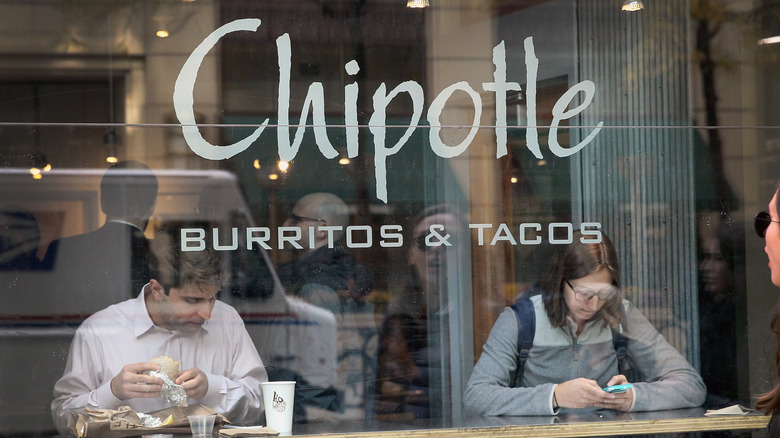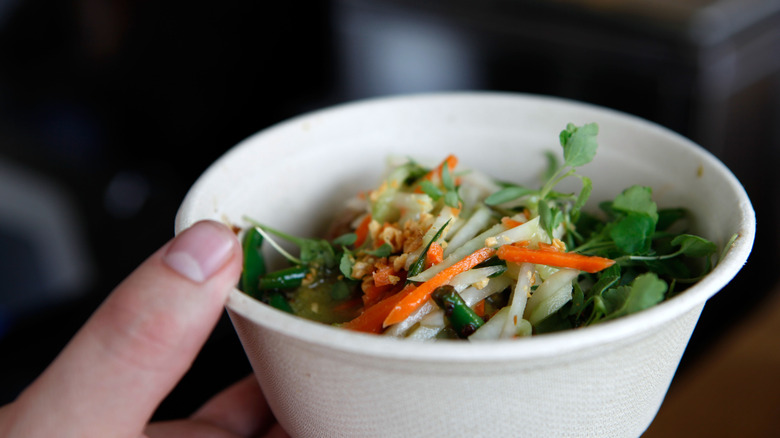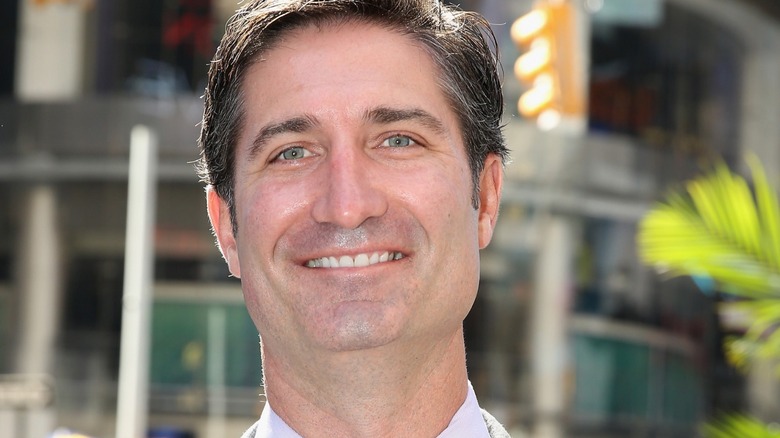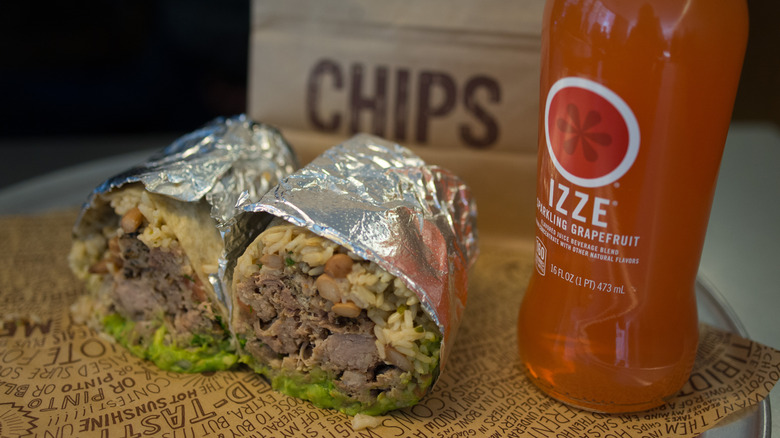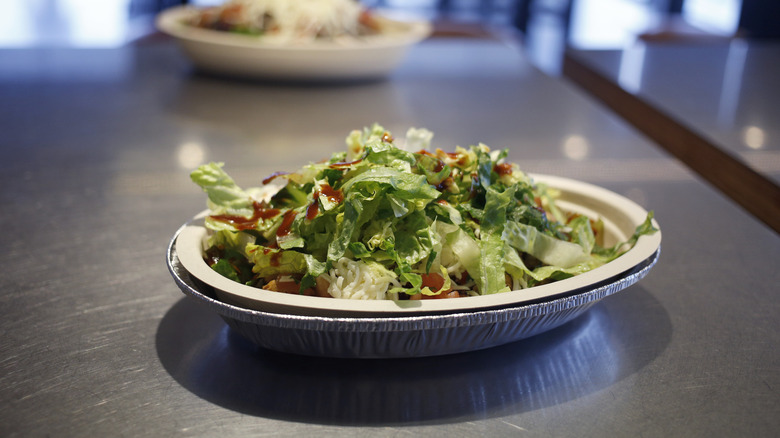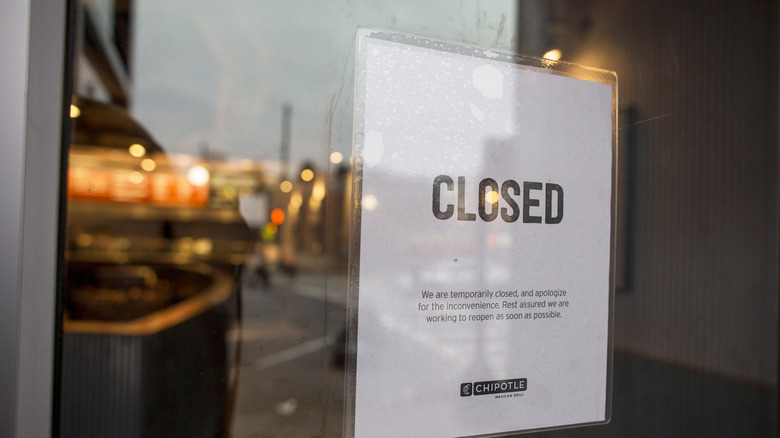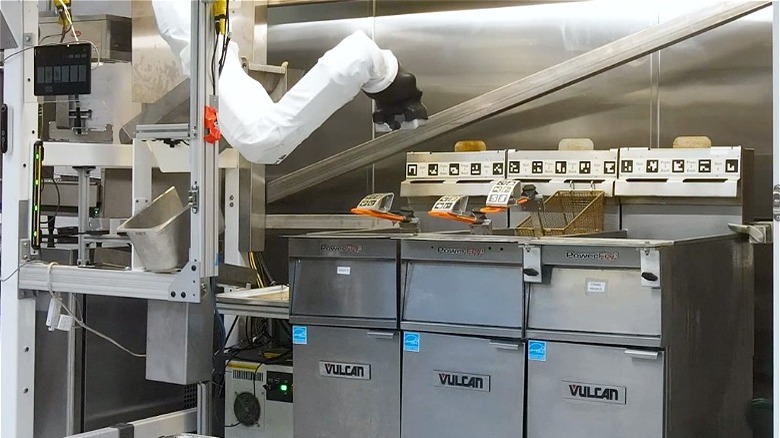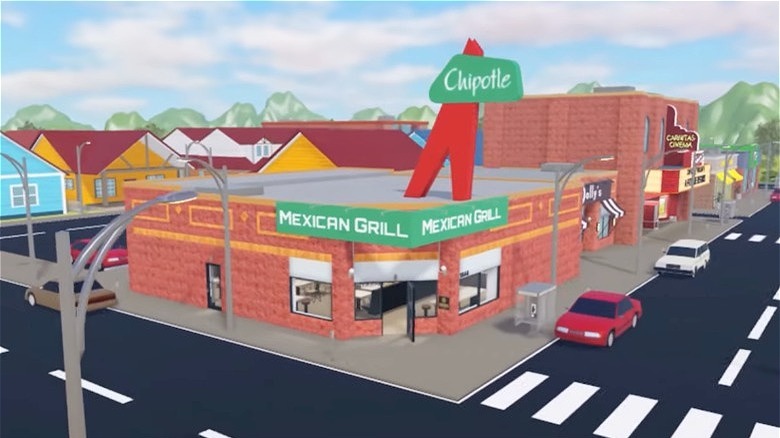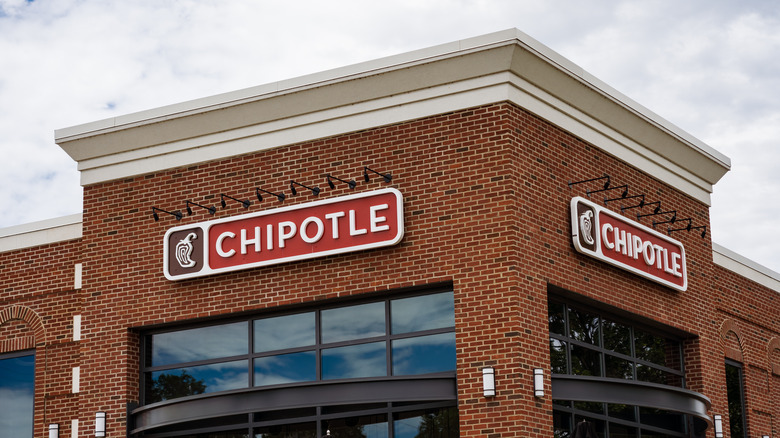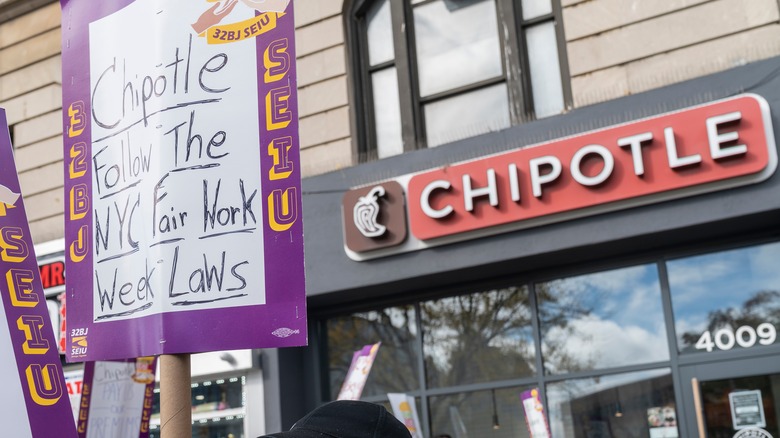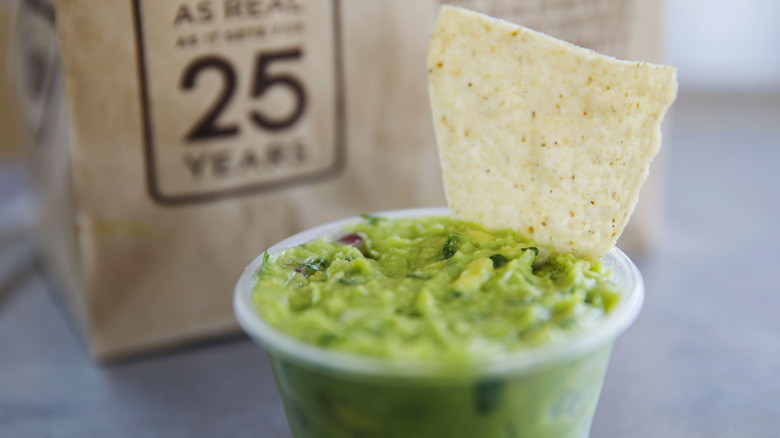The Untold Truth Of Chipotle
Over the last several years, a shift has been taking place in fast food with people straying from the land of drive-thrus and value meals in favor of food assembled on the spot. We're talking about the emergence of fast-casual chains, and Chipotle Mexican Grill has been a driving force in this trend. Compared to just about every other successful fast food chain on the market, Chipotle takes an opposite approach in its operations. There is no dollar menu or kid's toys, and people don't even have the option of ordering a meal that's already prepared and waiting for them in a warming tray. In the world of fast food, Chipotle is definitely the black sheep.
Chipotle's approach to food and the success that followed hasn't come without a few bumps in the road though. The company had a somewhat contentious relationship with McDonald's, and has weathered numerous food safety scandals. Love it or hate it, here's the story behind Chipotle's many ups and downs.
Chipotle's founder wanted to open a fine dining restaurant
When you consider that Chipotle's founder, Steve Ells, has an estimated net worth of $200 million, it's obvious that the burrito business has been very good to him. The success of Chipotle Mexican Grill doesn't exactly boil down to luck, but building an empire on Mexican street food was hardly the culinary plan that Ells had for himself.
Ells graduated from the Culinary Institute of America in 1990 and began cooking at the legendary Stars restaurant in San Francisco before leaving to start his own business. Burritos were meant to only be a short-term business venture to build up cash for a fine-dining establishment. "This was going to be one restaurant," Ells told NPR (via CNBC). "I knew that full-scale restaurants were a dicey proposition. I mean, they go out of business often. It's hard to make margins, very difficult to operate. And so I wanted Chipotle to be a backup."
Chipotle, of course, turned out not to be a backup plan and Ells was working every day for two years while his burrito restaurant grew in popularity. "I remember feeling a little guilty every time I opened a Chipotle," Ells confessed. "I remember feeling a little guilty because I wasn't following my true passion. But that eventually went away. And I realized that this is my calling."
It didn't take long for Chipotle to become a local hit
If there ever was an overnight success in the food business, Chipotle comes pretty close. Steve Ells opened his first location in 1993 near the University of Denver at 1664 East Evans Avenue. It was hardly the size of today's Chipotle restaurants — the first taqueria was only 850-square feet with a monthly rental rate equal in size.
"We were very concerned, Steve's father, Bob Ells, told Bloomberg. "We figured there was a possibility that he would probably have to come home and live with us, and we'd have to continue to subsidize his income."
Despite not having any menus, it didn't take long though for local residents to start buying up burritos. Ells made a few hundred dollars on his first day of business and doubled it on the second day his restaurant was open. A review in the Rocky Mountain News came soon after and it wasn't long before the first Chipotle was serving 1,000 burritos a day and Ells exceeded the goal he'd set of making a $24,000 profit in the first year.
Ells' Mexican street food business was proving to be incredibly successful and within just four years, he'd taken over the Denver area with 14 Chipotle locations and was racking up a yearly revenue between $14 and $18 million.
Chipotle's minimalist design was more about saving money than being cool
Numerous fast food restaurants have been updating the look of their spaces in recent years. From Wendy's renovating their stores with recycled materials to Hardee's trying to give their stores a facelift that "celebrates small-town America," minimalism in the fast food restaurant layout is in more now than ever. Chipotle has been adhering to this design aesthetic for years though, with its exposed piping, and abundance of stainless steel and plywood. While the look may be cool nowadays, in the beginning, it was more about saving a few bucks.
"There was not a lot of money for a lot of flourishes," Ells told Entrepreneur. "We had to make use of some very basic materials but have those materials speak to this brand that I was creating."
Many of the materials for those first few stores Ells bought from local hardware stores in the Denver area. Choosing to use more raw and bare bones building materials is something that the Chipotle founder sees as being parallel with the brand's focus on its rather simplistic menu. "You see the raw ingredients," Ells said. "Then you elevate these raw ingredients, hopefully into something special."
With over 1,000 restaurants these days, the company now has an architectural firm handle the designs — though Chipotle locations still feature a lot of steel and plywood. It's sorta their vibe.
McDonald's was instrumental in Chipotle's growth
The first Chipotle restaurants were funded with the help of Steve Ells' parents and family friends. Bob Ells had given his son $75,000 to kickstart the operation and by 1996, Ells had raised an additional $1.3 million — but that money would only take Chipotle so far, and a bigger investor was needed.
Through a friend of a friend of Bob Ells, Steve was able to get himself invited to McDonald's headquarters in Illinois, where he whipped up a sampling of Chipotle's food offerings. The food was an instant hit with the Golden Arches executives and over the course of a year, the details were ironed out and McDonald's came on board as an investor and committed $50 million to growing Chipotle that first year — with much more monetary investment yet to come. The company not only had buckets of McDonald's money behind them to help with growth, but had the knowledge of McDonald's at their disposal when it came to massively scaling that growth.
"They helped us learn how to keep track of our foods and our systems a little better," Steve Ells' high school buddy and onetime head of social media, Joe Stupp, said. "And I think they helped us understand what it's like to run a larger chain, which was something that we couldn't really figure out before then."
The McDonald's money proved to be the fuel for Chipotle's growth and by 2005, the company had expanded to 460 restaurants.
Chipotle and McDonald's didn't always see eye-to-eye
In 2005, McDonald's parted ways with Chipotle, took the $1.5 billion it had made from growing the chain, and went back to focusing on burgers and fries. Industry experts and investors have since ruled that move a huge mistake for McDonald's and pointed out that in less than a decade, that $1.5 billion would have been worth $15 billion. However, it's likely the business relationship had simply run its course.
Chipotle's former communications director, Chip Arnold, described the business relationship as one with a bit of friction. "I would think of it in terms of McDonald's being the rich uncle and Chipotle as the petulant nephew where we take the money and are grateful but are stubborn and strong-willed enough that we're going to do what we want with it anyway," Arnold said. McDonald's tried to get Chipotle to install drive-thrus, develop a breakfast menu, even change the name of the restaurant.
"One of the McDonald's guys thought we should call it "Chipotle Fresh Mexican Grill," because the term 'fresh' was such a great term, and Baja Fresh had 'fresh' in its name," Chipotle's then-co-CEO, Monty Moran, said.
Steve Ells simply summed things up as the two companies having very different approaches to food and people. As for McDonald's pulling out, McDonald's CEO Steve Easterbrook (who was not CEO at the time) said Chipotle was basically a distraction that pulled attention away from the McDonald's brand.
Chipotle's non-GMO policy has been good for business
Fresh produce and meat has been a benchmark of Chipotle's operation for years, but in 2013 is when the company really started to turn some heads with its approach to food. As part of the company's "food with integrity" motto, Chipotle announced that it would only be serving foods that had not been genetically modified. "Transparency and giving our customers information about where their food comes from is a core part of who we are as a company, and we felt that GMO disclosure was a key component of that," Food with Integrity program manager Joshua Brau said at the time.
While serving non-GMO foods was more expensive for the company and did result in an increase in menu prices, the decision proved to be a huge hit with Chipotle's base. By 2014, same-store sales were up almost 17 percent with a net income increase of 36 percent. The move was lauded at the time by investors for giving millennial consumers what they wanted and helped the restaurant stand out from fast food competitors.
But Chipotle's non-GMO claims have been called into question
The pushback on non-GMO foods has certainly been a popular one, but that doesn't mean every aspect of it is grounded in reality. As pointed out by National Geographic, the attention given to the perils of eating GMO foods is often a lot of hype that's based on bad science. Despite some research finding that GMO-raised livestock did not produce meat, milk, and eggs that was any less healthy than non-GMO raised livestock, Chipotle's non-GMO push has proved successful... mostly.
In April of 2016, the company was hit with a lawsuit claiming that Chipotle's non-GMO campaign wasn't entirely truthful. The lawsuit alleged that restaurants sold meat and dairy products from livestock that had been raised on at least some genetically modified feed and that the soda in its fountain drinks used genetically modified sweeteners. What is and what isn't a GMO food, however, can be a little dicey, depending on who you ask. Chipotle hit back and argued that "reasonable consumers" understood that some GM feed could be part of a cow's diet, but that didn't mean the beef was then genetically modified.
While the issue hasn't yet been legally settled, the courts haven't cut Chipotle a break and the company's requests to dismiss lawsuits filed in California, Maryland, and New York were denied.
Chipotle's queso launch was a disaster
Queso, whether for dipping tortilla chips or layering inside a burrito, is a beloved component of Tex-Mex cuisine. That said, it's never a good sign when customers at a chain as popular as Chipotle, label the queso as "a crime against cheese." So where did Chipotle go wrong with what should have been a surefire hit?
Well, it really boils down to Chipotle trying to get too fancy with its queso and force it to adapt to the company's "food with integrity" mission. Queso is typically made with processed cheeses like Velveeta, and that just didn't have a lot of integrity in the eyes of Chipotle. "Additives make typical queso very consistent and predictable, but are not at all in keeping with our food culture," Ells said in 2017. "Our queso may vary slightly depending on the characteristics of the aged cheddar cheese used in each batch, but using only real ingredients is what makes our food so delicious."
Only those "real ingredients" were anything but delicious to customers. People tweeted out images of the queso going right into the trash and the company's stock took a nosedive. Thankfully, the company found a way to improve — depending on who you ask — the cheese consistency of those real ingredients in the queso recipe, and the item remains on the menu.
Chipotle workers have their reason for always telling you guac is extra
Tell the person preparing your food at Chipotle that you want guacamole and they'll most definitely remind you that it cost extra. As if you were some lowly burrito-lover who couldn't splurge for the creamy avocado goodness that is guac... what gives?!
According to Chris Arnold, former director of communications at Chipotle, employees do this so customers aren't caught off guard by the extra price. "We don't want customers to be surprised by the added cost, so we tell people whenever they ask for it," Arnold said in 2015. "Not every restaurant charges extra for guac, so there may be customers who expect that we don't either." There's also another reason that boils down to you getting your food quicker.
If employees neglected to inform customers guacamole was extra, it would surely result in a line slow down with many a confused customer asking about the extra cost. As for that extra charge, well, the price of your guacamole is susceptible to everything from weather conditions to government-issued tariffs on avocados from Mexico. Of course, you could avoid the extra charge of paying Chipotle to make your guac and whip it up yourself at home using the company's own guacamole recipe.
Chipotle managers must adhere to a strict checklist
In order for a Chipotle store to be a success, it must operate like a well-run ship and the manager is the captain making sure the ship stays on course. Chipotle's managers are reviewed quarterly and are subjected to a 39-point checklist of various pitfalls to avoid during this review process. Former co-CEO, Monty Moran called it "the most important tool" for guaranteeing a manager runs a successful store. Yeah, it's pretty serious.
So what's on this 39-point checklist that can make or break a manager? Well, aside from the usual points about food prepping, there are more nuanced things like ensuring the employees are inspired by the Chipotle vision and creating an environment where new employees are set up for success. Repeatedly failing to pass the 39-point checklist obviously would get a manager canned; however, if a manager is so skilled that they can elevate an employee to a managerial level, they get a sweet $10,000 bonus.
Chipotle stores have a carefully curated music playlist
Nobody goes to Chipotle for the music... or do they? According to Billboard, a playlist curator for Chipotle is one of the hottest jobs in the music industry. That's right — the company doesn't just throw on any old internet radio station for people to listen to while eating tacos. They have an expert put it together, and that musical mastermind is Chris Golub. Golub has a background in both the food industry and music, which made him a good fit for the position when Steve Ells approached him in 2009 about making playlists for Chipotle's restaurants.
"What our company does is, what I like to call, creating a musical identity," Golub said. Golub works with other clients via his company Studio Orca, but Chipotle is by far the largest and he'll sometimes scour through 300 songs before selecting the perfect one that compliments tortilla chips. Finding that ideal song isn't something that is simply based on having a catchy beat either, Golub has to take into account the restaurant's building materials too. The concrete floors and abundance of steel don't always work well with certain musical sounds. Just something to think about next time you're enjoying your burrito bowl and Peter Tosh is playing over the speakers.
Chipotle tried to go beyond burritos
Chipotle has attempted to do what it did for burritos with burgers, pizza, and Asian noodle bowls, but alas, these efforts haven't proven to be as popular as tacos and guacamole.
Chipotle tried its hands at Asian noodle and rice bowls in 2011 with ShopHouse, a chain of 15 stores that were scattered throughout California, Illinois, Maryland, and Washington, D.C. ShopHouse bit the dust in 2017 though, a victim of the company's struggles with its food safety issues. Next on the chopping block was Tasty Made, a single store burger joint located in Lancaster, Ohio that opened in 2016 in an attempt to capitalize on a concept similar to In-N-Out Burger. Unlike In-N-Out Burger, folks weren't lining up in droves for Tasty Made and the food didn't get the best reviews. A brief change up of the menu was made, but it wasn't enough and Tasty Made flipped its last burger in 2018.
The company does still have its foot in the pizza game with its assembly line-style pizza joints — Pizzeria Locale. The casual pizzerias launched in 2011 out of Colorado and eventually expanded to Kansas City and Cincinnati. Those locations didn't stick around long, however, and Pizzeria Locale is now back to just two locations in Denver.
Chipotle's founder stepped down in 2018 and a Taco Bell CEO took over
When Steve Ells founded Chipotle in 1993, it started as the first fast food restaurant of its kind nestled in Denver, Colorado. Its "build your own" Tex-Mex style produced with fresh ingredients quickly grew in popularity and one store turned into more than the 2,800 now open today. Up until 2017, Ells shifted between CEO and co-CEO roles until he relinquished his position to focus on innovation efforts and became Chipotle's chairman of the board (via USA Today).
Chipotle had big shoes to fill, until Brian Niccol, former CEO of Taco Bell, stepped up for the challenge in 2018. After spending seven years at Taco Bell, Niccol knew the ins-and-outs of engaging marketing and sales, but supporters were concerned that he would over-commercialize Chipotle. Despite skepticism, sales at Chipotle rose more than 30% and stock prices rose more than 500% during his first three years as CEO (via Investors).
Niccol metaphorically turned Chipotle around by improving food quality and introducing new menu items marketed toward healthy living like its lifestyle bowls. He also embraced drive-up pick-up lanes and grab-and-go windows for takeout orders, which boosted digital sales by almost 88% to amass a billion dollars in sales (via Restaurant Business). Not to mention, Niccol rewrote the standard for other fast food companies by increasing product prices by four percent in order to raise minimum per hour wage to 15 dollars –– everyone take notes (via Investors).
Chipotle isn't as healthy as you think
Chipotle prides itself on its use of fresh ingredients, made-to-order meals, and incredibly effective marketing. Plus, it even tastes healthy, fulfilling the delusion that the mass quantities of rice, meat, and freshly-made salsa are better than other competing options. However, that bubble burst when the New York Times published the nutritional data from over 3,000 Chipotle orders, discovering that many orders are health-washed.
The research found that the average Chipotle order is around 1,070 calories, typically representing a burrito bowl with meat, cheese, sour cream, rice, beans, and some chips. The average Chipotle order also has around 2,000 to 2,400 milligrams of sodium –– almost a full day's recommended amount –– and 75% of the daily recommended amount of saturated fat. Usually, the meals with the highest calories are burritos full loaded with meat, cheeses, and with a side of chips and guacamole. That being said, 98% of orders were under the 2,000 calorie mark, so it's not a common thing to eat a day's worth of calories in one Chipotle meal.
Competitors like Qdoba and Moe's have similar numbers. When comparing the nutrition facts of a chicken burrito with rice, beans, and cheese, it's about 1,100 calories at Chipotle. At Moe's, that same burrito is around 830 calories, while that same burrito (the signature Chicken Queso Burrito) at Qdoba is around 1,080. None of these fast food joints are perfect, but it is still delicious in moderation (or not).
Chipotle's bowls and salads are its healthiest options
Yes, we just talked about how unhealthy Chipotle was, but in reality, Chipotle is still a great fast food choice with healthy options that shouldn't be avoided because of high calories (your body will thank you). However, if you are trying to choose lighter alternatives, Chipotle is full of selections for every dietary need and preference.
Chipotle's line of Lifestyle bowls released in 2020 are easy-breezy bowls that come in keto, Whole 30, paleo, vegan, and vegetarian options that are packed full of nutrients and fiber. Overall, the burrito bowls and salads are the "healthiest" option for their balance of healthy carbs, protein, and vegetables. Tacos are also a great option made with hard corn tortillas that are high in fiber, naturally gluten-free, and the perfect amount of salty.
If you want to customize your own healthier Chipotle order, opting for brown rice as opposed to white rice, as well as adding more fajita veggies and salsas helps you achieve that daunting two to three cups of recommended vegetables a day. Don't forget the beans too for an extra boost of fiber, iron, and plant protein and swap out a side of chips for a crunchy taco shell for a less-salty fix that won't leave you instantly dehydrated (via Today).
Chipotle has had numerous health outbreaks
From 2008 to 2018, Chipotle has had around nine reported outbreaks. These outbreaks struck stores all across the country from Los Angeles all the way to Virginia, making over 1,100 people sick from various food-borne illnesses (via Food Poisoning News). As of 2022, things seemed to have cooled down in terms of outbreaks, thanks to improved food safety precautions, better technology, and employee incentives.
The first known outbreak was traced back to March 2008 at a Chipotle in San Diego after 22 people tested positive for Hepatitis. One month later, a Norovirus outbreak in Ohio left over 500 people ill and the cause of the breakout was unable to be traced. Chipotle stayed under the radar until five separate outbreaks of E. coli, Salmonella, and Norovirus struck stores in California, Minnesota, Washington, Oregon, and Boston between August and December 2015. The cause of the Minnesota Salmonella outbreak was traced back to contaminated tomatoes served at almost two dozen Chipotles in the area (via Food Safety News). A Norovirus outbreak hit a Virginia Chipotle in 2017 after an infected employee returned to work sick, and the final reported outbreak in Ohio in 2018 was caused by food kept at unsafe temperatures (via Food Poisoning News).
In 2020, Chipotle agreed to pay $25 million to resolve charges related to the outbreaks, and ultimately, the employees and managers were blamed for many of the outbreaks despite short-staffing issues amplified by high customer traffic (via Food Safety News).
Millennials eat the most Chipotle
It's not surprising that millennials love Chipotle, just like they stereotypically love Target, Starbucks, and Chick-fil-A. In a 2018 Statista report, around 25% of Chipotle customers were ages 18 to 29, while only 10% of customers were around 50 to 64 years old. However, according to Insider, male millennials are the typical Chipotle customer ranging from ages 25 to 34, are married without kids, and tend to live in urban areas.
Fifty-one percent of customers are white, and people of color are more likely to visit Chipotle than any other similar chain. One average, customers make around nine trips to Chipotle yearly and spend around 17 dollars per trip. Surprisingly, Chipotle customers spend more money and time at McDonald's annually (via Insider). In order to effectively target more millennials and zoomers, Chipotle developed a personalized rewards club program called Guac Mode on Monday to understand their buying patterns and decisions (via Restaurant Business).
That being said, the demographics of Chipotle's workers are similar to its customers. Almost 50% of workers ages 20 to 30 and 51% are women. Over 55% of workers are White, while around 23% at Hispanic or Latino, and the most common foreign language spoken is Spanish (via Zippia).
Chipotle is investing in new technology
Chipotle is a visionary in the fast food industry, so it's not shocking that it is leading the pathway for tech innovations. From robots to an all-digital restaurant, Chipotle is paving the way toward the future of fast food and the service industry as a whole.
In 2021, Chipotle invested in Nuro, the SoftBank-backed startup responsible for Domino's self-driving delivery vehicles. The company also created the cheerfully-named robotic tortilla chip maker, Chippy, to cut back on labor costs for repetitive tasks and offer solutions for the service industry's labor shortages (via CNBC). In November 2020, Chipotle even opened its first-ever digital-only ghost kitchen without its signature front service line and uncomfortably-seated dining room meant to assist with catering and online orders (via Chain Store Age).
Chipotle is also streamlining advanced in-house restaurant technology such as software for managing inventory, scheduling, mobile payments, tools to analyze staffing efficiency, and AI-based training programs (via CNBC). CEO Brian Niccol told the Washington Post that Chipotle started using vision technology through machine learning to help prep the appropriate amount of vegetables for lunch and dinner shifts. Niccol also explained that it was important to streamline technological advancements as much as possible, but not at the expense of the employees or customers to preserve personal interactions.
Chipotle offers lots of promotions
Sometimes, it feels like Chipotle is giving away free food like it's nothing, or making up holidays just for marketing purposes. Aside from holiday specials like the free queso deal on Cinco de Mayo and free birthday guacamole, Chipotle offers dozens of low-key and overly-hyped promotions for free or discounted food (via Chipotle Newsroom).
One of Chipotle's oldest promotions is its "Boorito" Halloween deal where guests would get five dollars off any entree if they showed up in costume. However, the promotion was slightly tweaked in 2021 where guests could get the discount by using a promo code online or if fans visited the virtual Chipotle restaurant as a costumed avatar on the online gaming platform, Roblox (via AS USA). This isn't Chipotle's only collaboration with Roblox –– in 2022, Chipotle launched the Burrito Builder on Roblox for National Burrito Day, a simulation were players could make burritos in the metaverse, earn Burrito Bucks, and exchange them for promotion codes for free food (via PR Newswire).
In 2019, Chipotle rewarded a lucky fan with a Chipotle Celebrity Card that guaranteed a year's worth of free food to the one-millionth Chipotle rewards member. The promotion ended in 2019, but it garnered a lot of publicity when celebrities posted on social media their gifted Celebrity Cards from Chipotle (via Twitter). Another past promotion with a mysterious origin was Chipotle's burrito coins, which fans on Reddit suspected was the same as burrito bucks, but the origin or how to get it is more speculative than anything.
All Chipotle companies are company-owned
There are thousands of Chipotle restaurants across the country, making it seem like one of the most sought-after franchises in the restaurant business. However, it may surprise you that all Chipotle stores are company-owned. Despite other large fast food brands like McDonald's and Wendy's expanding their franchises, Chipotle continues to grow and prosper even without franchise operators (via Franchise 500).
According to Insider, outsider operators fund the majority of costs of running and building the business when companies franchise. However, companies then give the franchisees a portion of the profits, thus inadvertently helping the profits and number of stores grow. When Chipotle was founded in 1993, founder, Steve Ells, resisted franchising and used networking for funding through large companies like McDonald's. These large investments allowed Chipotle to push itself past other competition in order to be in a place where it had the financial freedom to control every aspect of food culture, preparation, and work culture. A Chipotle spokesperson told Insider that Chipotle wasn't going to franchise because they don't need the money to grow and "don't have trouble attracting great people to run our restaurants."
Chipotle has been sued multiple times
Aside from multiple health outbreaks, Chipotle has been in the hot seat for multiple allegations of false advertising, unpaid wages, scheduling violations, and sexual harassment.
As previously mentioned, Chipotle has a problem with health-washing some of its foods. In 2016, Chipotle was accused of providing false nutritional information for an advertised 300-calorie chorizo burrito that was actually over 1,000 calories on Chipotle's nutrition calculator. Chipotle was sued in Los Angeles County Supreme Court, where a menu labeling law requires chain restaurants to accurately list nutritional information (via Los Angeles Times).
That same year, 10,000 employees across the country sued Chipotle claiming that they were not paid for extra hours worked in order to meet budget goals (via CNN Business). Eventually, it was settled in 2021 with Chipotle paying $15 million to almost 5,000 affected employees (via Restaurant Dive). That's not all –– in 2021, Chipotle was sued by New York City for $150 million due to violating its fair scheduling law (via New York Times), and by the state of Massachusetts for over 13,000 violations of its child labor law (via New York Times). In 2022, Chipotle was sued for alleged sexual harassment and assault involving two female employees and their coworkers while working at the restaurant. The case is still under investigation (via EEOC).
If you or anyone you know has been a victim of sexual assault, help is available. Visit the Rape, Abuse & Incest National Network website or contact RAINN's National Helpline at 1-800-656-HOPE (4673).
Chipotle uses a lot of avocados
On average, Chipotle customers order almost 50 million pounds of guacamole yearly, requiring the chain to use more than 450,000 avocados daily in restaurants across the country (via Chipotle Newsroom). With the continuing demands for more avocados, Chipotle is getting creative with its food sourcing and repurposing of leftover avocados.
Since Chipotle buys around 5% of the world's supply of avocados, the company has been seeking avocados from unconventional sources, including singer Jason Mraz. Mraz bought a five-acre farm back in 2004 in the hopes of converting it into an organic avocado grove that would put an emphasis on sustainable farming and locally-grown produce. As of 2014, the Oceanside avocado farm sold around 34,000 pounds of avocados to Chipotle (via The Baltimore Sun). Now, you'll have "I'm Yours" stuck in your head every time you eat Chipotle.
In order to combat the food waste problem resulting from thousands of avocados, Chipotle decided to repurpose its avocado pits in a unique way. The company launched Chipotle Goods in 2020 –– a "responsibly sourced" line of clothing and other products made with organic cotton and dyed with leftover avocado pits. The project was meant to combat the nearly 300 million avocado pits that go into landfill every year from Chipotle stores alone with products like hand-dyed leggings, shirts, jackets, and tote bags (via CNN Business). Critics praise the sustainability efforts, but worry that the project is more "greenwashing" marketing that doesn't actually solve the main problems associated with food waste, production, and climate change (via The Counter).
